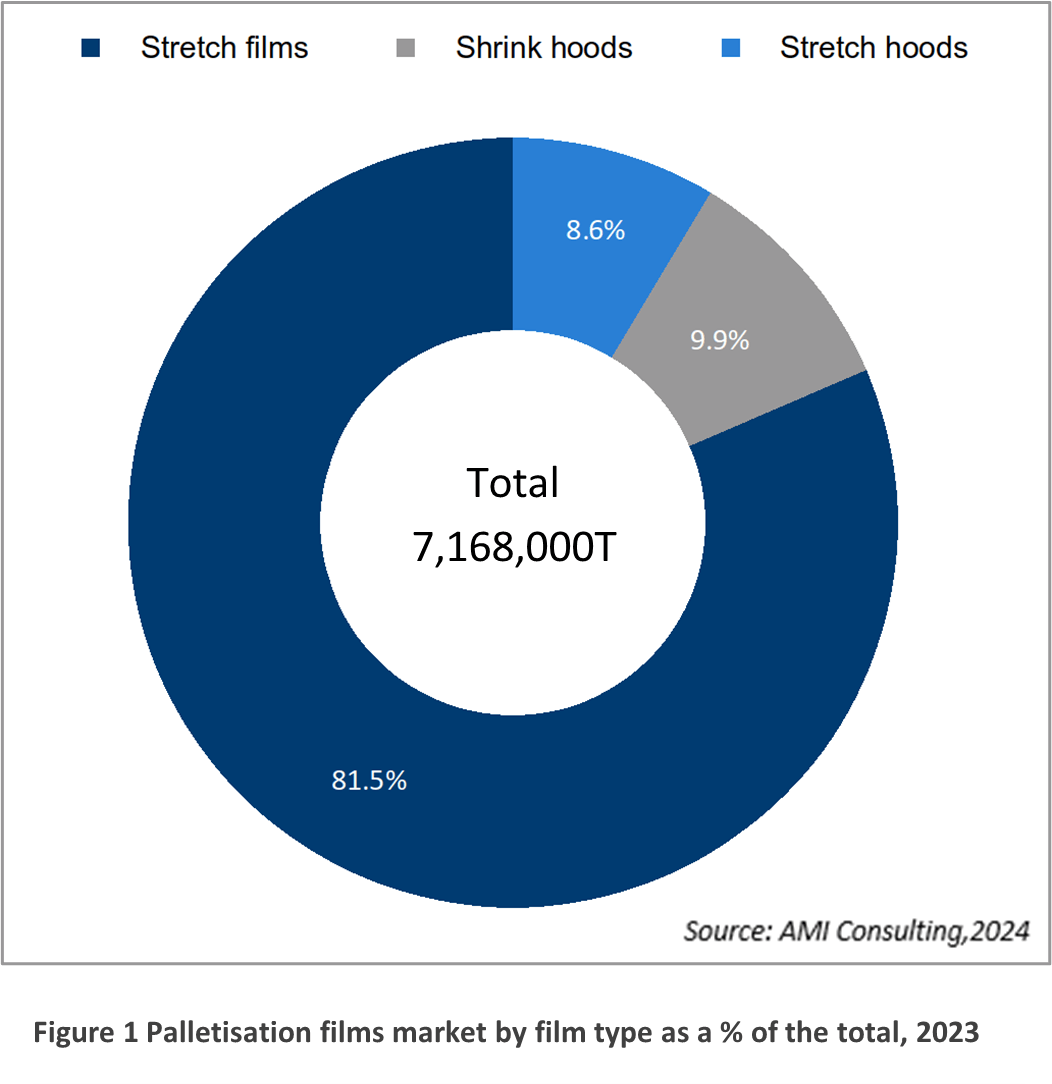Standout Insights into the Global Stretch and Shrink Film Market Found in New Report
11 April 2024

Palletisation films market by film type as a % of the total, 2023
AMI are excited to announce the release of our latest report on the global market for stretch and shrink film titled "Stretch and Shrink Film: Global Market 2024."
This comprehensive report is the result of an extensive primary research programme, providing a detailed independent assessment of both the industry and the market. The report quantifies the demand and production of pallet stretch wrap, shrink hoods and stretch hoods in each world region with a five-year forecast. It examines polymer demand and inter-material competition as well as the industry structure and latest developments of major global palletisation film producers.
The global market for palletisation films demonstrated a moderate average growth rate of 2.9% over the 5 years from 2018 to 2023, reaching 7.2 million tonnes. Despite the maturity of established countries, the demand for stretch and shrink film is growing worldwide. Developing regions are witnessing significant investment and growth in this sector, presenting lucrative opportunities for industry players.
The dynamics of the stretch and shrink film market have shifted, and the future of the pallet stretch wrap market is now global in scope, as opposed to being primarily regional. Palletisation film has become more global in scope, with Europe accounting for 32% of the global demand and 30% of supply in 2023.
Pandemic-induced business optimism, fuelled by quantitative easing, recovery funds, and financial aid packages stimulating private consumption and construction activities, led to a global over-investment in new production capacities. Unfortunately, due to long equipment delivery times, many of these new machines came online just as demand weakened, particularly in Europe following the energy crisis.
Stretch wrapping films capture 82% of the total market by weight, followed by shrink hoods and stretch hoods. The demand for shrink hoods is shifting towards stretch hoods in most regions. The adoption of stretch hoods is becoming increasingly attractive for a wider range of transported goods at the expense of shrink hoods. As the cost of wrapping machinery decreases because of higher competition from new entrants, and the wrap cost per pallet reduces as a result of thinner and stronger films, it is expected that stretch hoods will continue penetrating more than the spiral pallet wrap applications used by major customers.
Driven by media narratives, sustainability concerns and shifting public perception, consumers are increasingly seeking plastic-free or minimally packaged alternatives. Retailers are responding by offering options such as paper or reusable bags, cardboard bundling, and reusable containers for loose items. The pressure from consumers, coupled with environmental organisations and NGOs is pushing industry participants towards sustainability commitments and to set ambitious goals to minimise plastic packaging as a means of avoiding EPR taxation.
However, initial efforts to reduce plastic consumption have reached a point where further progress requires more complex solutions. To address this challenge, attention is turning toward advanced technologies and circular systems to effectively recover and recycle plastic waste. These include:
- Advanced Mechanical Sorting Technologies: Enabling more precise identification, cleaning, and separation of plastics for targeted recycling processes.
- Advanced Processing and Analytical Technologies: Limiting degradation and gel formation when reprocessing plastic waste into recycled plastics and blends, improving compatibilization of resin blends, and monitoring product quality during these processing steps.
- Chemical Recycling and Solvolysis: Offering alternative pathways to break down plastics into reusable components, even those traditionally considered difficult-to-recycle or "non-recyclable."
- Design for Recycling: Optimising packaging design from the outset to promote easier recyclability and reduce waste.
- Supply Chain Management Techniques: Ensuring efficient collection, transportation, and processing of plastic waste to maximise recycling potential.
In response to sustainability concerns, plastic converters are employing advanced techniques like lightweighting, developing new packaging designs and functions, while simultaneously improving the strength and performance of packaging materials. These advancements wouldn't be possible without developing sophisticated polymer resins that offer superior properties and enable more efficient recycling.
Stretch and Shrink Film – Global Market 2024 builds on and expands AMI's successful reports related to the palletisation industry and aims to help industry players:
- Evaluate growth dynamics
- Identify emerging opportunities
- Understand market constraints and competitive pressures
- Assess latest development in resin formulation
- Appreciate the degree of penetration of recycled and bio-material innovations
- Formulate coherent and robust business plans.
For further information please contact Brian.Hinchcliffe@amiplastics.com on Tel: +44 (0)117 924 9442. Alternatively, you can request your free report preview that contains more detail on the structure and findings of the report by following this link >